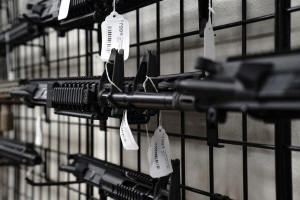U.S. Supreme Court throws out rulings upholding gun restrictions
 Send a link to a friend
Send a link to a friend
[July 01, 2022]
By Andrew Chung
WASHINGTON (Reuters) -On the heels of last
week's landmark ruling expanding individual gun rights, the U.S. Supreme
Court on Thursday threw out several lower court rulings that had upheld
gun restrictions including bans on assault-style rifles in Maryland and
large-capacity ammunition magazines in New Jersey and California.
The actions by the justices sent these cases back to lower courts to
reconsider in light of their June 23 ruling that declared for the first
time a constitutional right to carry a handgun in public for self
defense.
Last week's 6-3 ruling, with the conservative justices in the majority
and liberal justices in dissent, struck down New York state's limits on
carrying concealed handguns outside the home. The court found that the
law, enacted in 1913, violated a person's right to "keep and bear arms"
under the Second Amendment.
The ruling also clarified how courts must now assess whether regulations
are valid under the U.S. Constitution's Second Amendment, requiring them
to be comparable with restrictions traditionally adopted throughout U.S.
history. Legal experts say - and gun control advocates fear - such a
standard could lead courts to invalidate more gun restrictions
nationwide.
The justices' actions on Thursday mean that lower courts that allowed
gun restrictions will have to reconsider decisions including one
upholding Maryland's ban on "highly dangerous, military-style assault
rifles."
Maryland enacted its ban after a shooter used such a weapon in the 2012
mass killing of 20 children and six adults at Sandy Hook Elementary
School in Newtown, Connecticut. Five other states also ban these
weapons, Maryland said in a legal filing.
Assault-type rifles have been a recurring feature in U.S. mass shootings
in recent years including the May 24 attack that killed 19 children and
two teachers at an elementary school in Uvalde, Texas, and the May 14
attack that killed 10 people at a grocery store in Buffalo, New York.
The Maryland plaintiffs sued in 2020 despite conceding that their case
was doomed under a 2017 ruling by the Richmond, Virginia-based 4th U.S.
Circuit Court of Appeals, which had upheld Maryland's ban. The Supreme
Court declined to hear an appeal of that ruling.
[to top of second column]
|

An AR-15 upper receiver nicknamed "The Balloter" is seen for sale at
Firearms Unknown, a gun store in Oceanside, California, U.S., April
12, 2021. REUTERS/Bing Guan/File Photo
Contesting the term "assault weapon" as an inaccurate
"political term," the Maryland plaintiffs said that assault weapons
cannot be outright banned because they are in "common use" by
millions of law abiding individuals, just like the handguns at issue
in the landmark 2008 Supreme Court ruling striking down a ban on the
firearms in the U.S. capital.
The justices sent back to lower courts other rulings upholding bans
in New Jersey and California on firearm magazines with more than 10
rounds of ammunition. The challenges in those cases were filed by
state affiliates of the National Rifle Association, a gun rights
group closely aligned with Republicans.
The Supreme Court also threw out a lower court decision that had
upheld Hawaii's restrictions on openly carrying firearms in public
as valid under the Second Amendment.
Gun rights, cherished by many Americans and promised by the
country's 18th century founders, are a contentious issue in a nation
with high levels of firearms violence.
Last week's ruling represented the court's most important statement
on gun rights in more than a decade. The court in 2008 recognized
for the first time an individual's right to keep guns at home for
self-defense in a District of Columbia case, and in 2010 applied
that right to the states.
President Joe Biden, two days after the court invalidated New York's
gun measure, signed into law last Saturday the first major federal
gun reform in three decades.
The new law blocks gun sales to those convicted of abusing unmarried
intimate partners and cracks down on gun sales to purchasers
convicted of domestic violence. It also provides new federal funding
to states that administer "red flag" laws intended to remove guns
from people deemed dangerous to themselves and others.
It does not ban sales of assault-style rifles or high-capacity
magazines, policies Biden supports. But it does take some steps on
background checks by allowing access, for the first time, to
information on significant crimes committed by juveniles.
(Reporting by Andrew Chung; Editing by Will Dunham)
[© 2022 Thomson Reuters. All rights
reserved.]
This material may not be published,
broadcast, rewritten or redistributed.
Thompson Reuters is solely responsible for this content. |